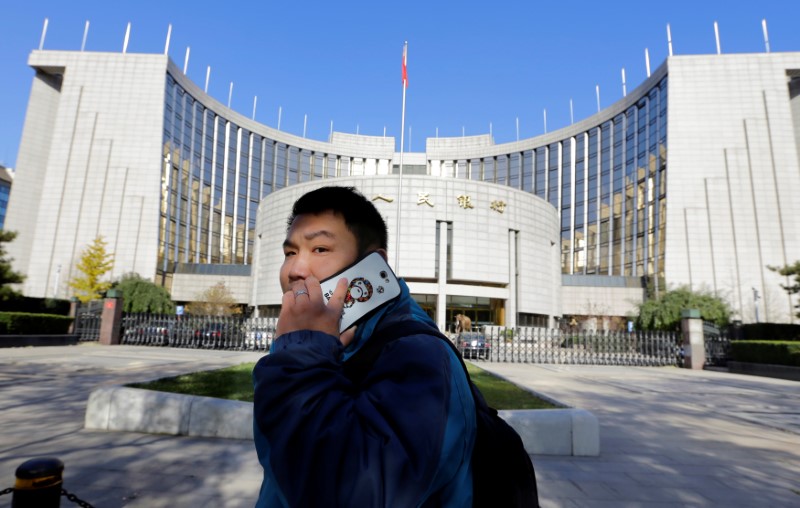BEIJING (Reuters) - China's foreign exchange reserves unexpectedly fell below the closely watched $3 trillion level in January for the first time in nearly six years, though tighter regulatory curbs appeared to making some progress in slowing capital outflows.
China has taken a raft of steps in recent months to make it harder to move money out of the country and reassert a firmer grip on its faltering currency, even as U.S. President Donald Trump steps up accusations that Beijing is keeping the yuan too cheap.
Reserves fell $12.3 billion in January to $2.998 trillion, more than the $10.5 billion that economists polled by Reuters had expected.
While the $3 trillion mark is not seen as a firm "line in the sand" for Beijing, concerns are swirling over the speed at which the country is depleting its reserves and how much longer it can afford to defend the currency.
Some analysts fear a heavy and sustained drain on reserves could prompt Beijing to devalue the yuan as it did in 2015, which would sow turmoil in global financial markets and likely stoke political tensions with the new U.S. administration.
To be sure, the January decline was much smaller than the $41 billion reported in December, and was the smallest in seven months, indicating China's renewed crackdown on outflows appears to be working, at least for now.
Economists expect more forceful tightening of regulatory controls after Tuesday's data, though China's financial system is notoriously porous, with speculators quickly able to find new channels to get funds out of the country.
"With FX reserves below $3 trillion, we can expect capital controls as well as tightening yuan liquidity to continue, as the authorities try to avoid a further drawdown," said Chester Liaw, an economist at Forecast Pte Ltd in Singapore, referring the central bank's surprise hike in short-term interest rates on Friday.
While the world's second-largest economy still has the largest stash of forex reserves by far, it has burned through over half a trillion dollars since August 2015, when it stunned global investors by devaluing the yuan.
The yuan <CNY=CFXS> fell 6.6 percent against a surging dollar in 2016, its biggest annual drop since 1994.
COULD HAVE BEEN WORSE?
The drop in January's reserves could have been worse if not for a sudden reversal in the surging U.S. dollar in January, some analysts said. The softer dollar boosted the value of non-dollar currencies that Beijing holds.
The yuan has gained nearly 1 percent against the dollar so far this year.
But analysts expect downward pressure on the yuan to resume, especially if the U.S. continues to raise interest rates, which would likely trigger fresh capital outflows from emerging economies such as China and test its enhanced capital controls.
The drop in reserves in January was mainly due to interventions by the central bank as it sold foreign exchange and bought yuan, China's foreign exchange regulator, the State Administration of Foreign Exchange(SAFE), said in a statement.
But SAFE said that changes in China's reserves are normal and the market should not pay too much attention to the $3 trillion level.
Still, the government may be getting close to a key decision point.
Some analysts estimate China needs to retain a minimum of $2.6 trillion to $2.8 trillion under the International Monetary Fund's (IMF's) adequacy measures, and fears of a devaluation would likely intensify capital flight.
